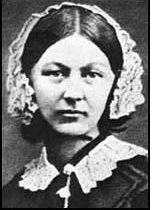Florence Nightingale

Florence Nightingale (1820 - 1910) was a British nurse who is considered the founder of modern nursing. She was affectionately called "The Lady with a Lamp" referring to how she carried an oil lamp during hospital night rounds.[1][2]
In 1854, Nightingale and approximately 38 other female nurses were dispatched to the main British military camp on the Black Sea during the Crimean War in order to nurse wounded and sick soldiers. They concentrated on providing clean quarters and linens, healthy food, improved air circulation and waste disposal, as well as increasing medical supplies. Death rates in the military camps dropped sharply and people of Britain embraced her as a hero. She was awarded the Royal Red Cross in 1883. In 1907, she was the first woman to receive the Order of Merit, Britain's highest civilian decoration.[3]
While stationed in Crimea, Nightingale developed "Crimean fever" (a bacterial infection now known as brucellosis) and never recovered.[4] She remained mostly bedbound the rest of her life. Although myalgic encephalomyelitis (ME) and chronic fatigue syndrome (CFS) were not defined in her lifetime, many current physicians and medical historians believe she developed ME/CFS as a result of a chronic brucellosis infection.[5][6]
"In 1854, from the age thirty-five to sixty-years, Florence Nightingale was reported as suffering from chest pains, headaches, rapid muscle fatigue, persistent upper back pain, and being unable to concentrate if more than one person was present."[7]
Despite being bed-bound, Nightingale continued until her death to work on advancing the nursing profession and lobbying for regulatory changes to hospitals. She met with government officials in her home and wrote thousands of letters to promote nursing reform.[8] Nursing pins designed with lamps are common throughout the world in order to honor Nightingale and her advancement of the profession of nursing.[9] The pledge that nurses take upon graduation is called the "Nightingale Pledge" which is analogous to the physician's Hippocratic Oath.[10]
Some ME/CFS organizations use Nightingale's name to commemorate her struggle with chronic illness. In 1988, Dr. Byron Hyde named his Canadian ME and CFS foundation, Nightingale Research Foundation:
"Disability does not mean the end to a useful life - we called our foundation Nightingale since many sufferers of M.E. and CFS typify the courage and dedication of Florence Nightingale and continue to live their lives under enormous disabilities."[11]
Nightingale's birthday, May 12th, was chosen as International Awareness Day for Chronic Immunological and Neurological Diseases.[12]
Learn more
See also
- May12th.org
- Nightingale Research Foundation
- Nightingale definition
- Byron Hyde
- Severe and very severe ME
References
- ↑ http://www.florence-nightingale.co.uk/resources/biography/?v=7516fd43adaa
- ↑ http://www.biography.com/people/florence-nightingale-9423539
- ↑ http://www.florence-nightingale.co.uk/resources/biography/?v=7516fd43adaa
- ↑ http://medical-dictionary.thefreedictionary.com/Crimean+fever
- ↑ Vallings, Rosamund (2019). "Chronic fatigue syndrome". J PRIM HEALTH CARE. 11 (4): 295–299. doi:10.1071/HCv11n4_ED2.
- ↑ https://www.bmj.com/content/312/7037/1040.1
- ↑ Roberto Patarca-Montero (2004). Medical Etiology, Assessment, and Treatment of Chronic Fatigue and Malaise. Haworth Press. p4. ISBN 078902196X
- ↑ http://www.florence-nightingale.co.uk/resources/biography/?v=7516fd43adaa
- ↑ http://www.nursinghistory.org/pinning-tradition/
- ↑ http://www.nursingworld.org/FunctionalMenuCategories/AboutANA/WhereWeComeFrom/FlorenceNightingalePledge.aspx
- ↑ http://www.nightingale.ca/index.php?target=about
- ↑ http://www.may12th.org/

